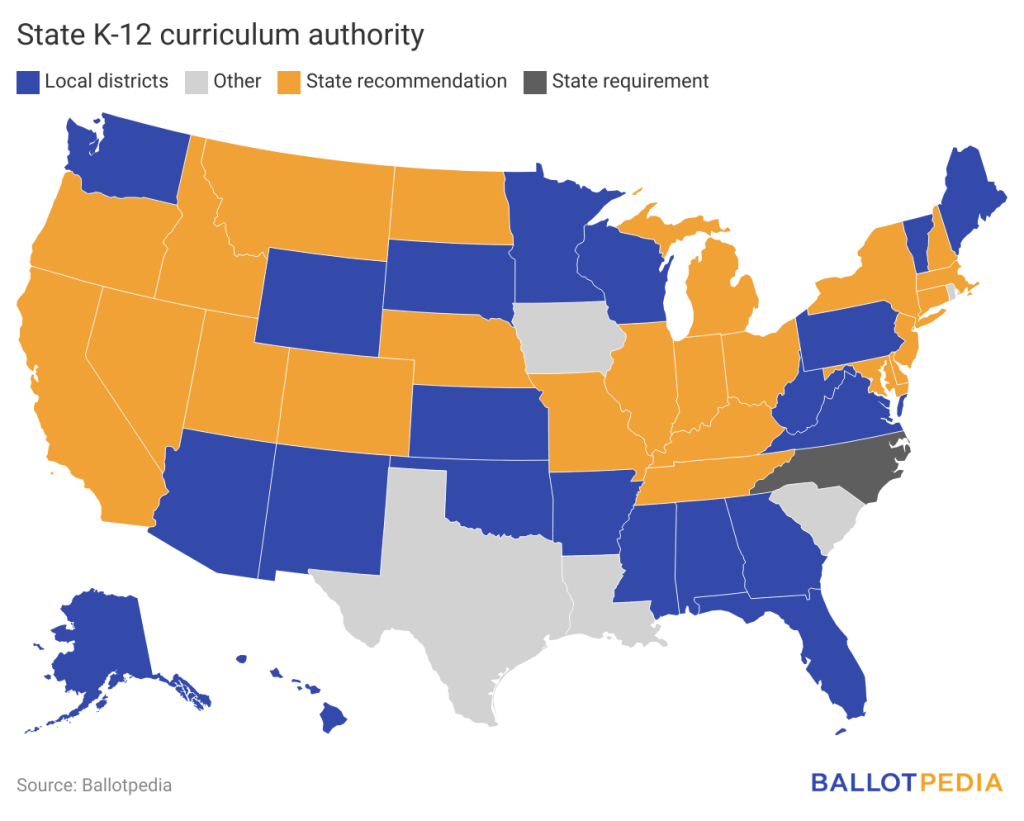Welcome to Hall Pass, a newsletter written to keep you plugged into the conversations driving school board politics and governance.
In today’s edition, you’ll find:
- On the issues: The debate over whether schools need more male teachers
- Share candidate endorsements with us!
- School board filing deadlines, election results, and recall certifications
- Here’s who approves K-12 curriculum in the 50 states
- Extracurricular: education news from around the web
- Candidate Connection survey
Email us at editor@ballotpedia.org to share reactions or story ideas!
On the issues
In this section, we curate reporting, analysis, and commentary on the issues school board members deliberate when they set out to offer the best education possible in their district. Missed an issue? Click here to see the previous education debates we’ve covered.
According to the most recent data from the National Center on Education Statistics (NCES), the percentage of male teachers in U.S. public schools dropped from 33% in 1980 to 23% in the 2020-2021 school year.
Today, we’ll examine arguments about whether the trend is cause for concern.
Richard Reeves writes that fewer male teachers is a problem and that positive male role models are important for children’s academic achievement, especially for boys. Reeves says male teachers are more likely to serve as mentors and lead after-school programs and extracurricular activities.
Ryan Fan writes that male teachers should not be expected to serve as mentors or father-like figures for their students and that both men and women can be positive role models. Fan says there is no evidence suggesting teachers’ gender affects education outcomes. He says the problems facing education are systemic and not tied to teacher demographics.
Head of the Class | Richard Reeves, No Mercy / No Malice
“I do think it is a problem and a policy concern. The emptying out of men from our schools is bad news for at least three reasons. First, having a male teacher improves educational outcomes, especially in certain subjects like English (where boys are lagging furthest behind girls). One study suggests that If half the English teachers in middle schools were men the achievement gap in reading between girls and boys would fall by approximately a third — a massive effect. … Second, male teachers are much more likely to take on after-school activities, especially coaching sports teams. A recent Brookings study finds a gender pay gap among K-12 teachers of about $2,200 a year in favor of men. The difference in base pay is just $700 a year. Most of the gap, about $1,200 a year, is explained by the extra pay men get from doing extracurricular work. … Third, the men in our schools are mentors to both male and female students. A recent study published by the National Bureau of Economic Research found that having an informal mentor in high school improved educational performance across a range of measures; most impressive was a 9% increase in college attendance.”
Do We Really Need More Male Teachers? | Ryan Fan, Medium
“The stereotype is ‘these kids don’t have positive male figures in their lives,’ which is true in some cases but not necessarily true in every case, and I find it a logical fallacy to conclude that because some students don’t have positive male role models in their lives, a male teacher is supposed to fill that role. I saw a colleague and good friend, who my supervisors didn’t think was doing what he was supposed to do, once get told ‘you could be a positive Black male figure in these kids’ lives, but you’re not!’ That’s just way too much of a gap and too much pressure to put on someone. We’re just teachers. The sudden need to become a positive father-like figure is a bit too much, and I don’t think it’s very fair either. And research from the Economics of Education Review found there is no empirical evidence to support teacher gender having an impact on student academic performance across 15 OECD countries. The bigger role models for children are peers or relatives over teachers. … More male teachers is not a band-aid for education’s problems. These problems are all very systemic, but when I think back to my teachers it wasn’t the gender of the teacher that ever made me connect with them at a deeper level.”
Share candidate endorsements with us!
As part of our goal to solve the ballot information problem, Ballotpedia is gathering information about school board candidate endorsements. The ballot information gap widens the further down the ballot you go, and is worst for the more than 500,000 local offices nationwide, such as school boards or special districts. Endorsements can help voters know more about their candidates and what they stand for.
Do you know of an individual or group that has endorsed a candidate in your district?
Click here to respond!
School board update: filing deadlines, election results, and recall certifications
Ballotpedia has historically covered school board elections in about 500 of the country’s largest districts. We’re gradually expanding the number we cover with our eye on the more than 13,000 districts with elected school boards.
New Hampshire
Fourteen seats on the Manchester School District school board in New Hampshire are up for election this year, with a primary on Sept. 19. The general election is Nov. 7.
November elections
Nov. 7 is the biggest election date of the year, and voters across the country will decide state and local races—including for school boards (subscribe to our Daily Brew newsletter for Ballotpedia’s coverage and analysis of elections up and down the ballot). Throughout the fall, we’ll preview the most interesting and pivotal school board elections happening that day. Let’s step back and take a look at the big picture.
We’re covering school board elections in the following 16 states on Nov. 7:
In seven of those states—Colorado, Kansas, Minnesota, Ohio, Pennsylvania, Virginia, and Washington—we are covering all school board elections on Nov. 7. We’ll be bringing you detailed coverage of many of those elections.
Here’s who approves K-12 curriculum in the 50 states
Recently, debates over what gets taught in public school classrooms have increasingly reflected national partisan concerns—so much so that governors and even presidents have waded into the curriculum controversies.
Consider two examples involving prominent governors.
In 2022, Florida Gov. Ron DeSantis (R) signed legislation requiring school districts to make public all instructional material, required readings, and library books, while also allowing parents to file formal objections to material they find unacceptable.
In California, Gov. Gavin Newsom (D) this year said he would fine the Temecula Unified School District after the board, citing references to Harvey Milk, the first openly gay man elected to public office in California, voted to reject an elementary school social studies curriculum. On Sept. 7, the California Assembly voted to send AB 1078 to Newsom’s desk. The bill would prohibit school districts from rejecting “instructional materials that accurately portray the cultural and racial diversity of our society.” Newsom has publicly backed the bill but has not signed it as of this writing.
These examples provide a glimpse into the political conflicts over curriculum. But what do state laws actually say about who sets public school curricula?
To answer this question, we searched our database for state-specific information about curriculum authority, requirements, and statutes in every state. Depending on the state, the law directs state-level entities—like state boards of education—or local districts or schools to develop and approve curriculum. In some cases, state and local entities may both develop and approve curriculum.
- In 45 states, a local entity (such as school districts and local schools) develops curriculum.
- In Colorado, North Carolina, and Rhode Island, state-level entities (such as state boards of education and state education agency leaders) develop curriculum.
- In South Carolina and Texas, both state-level entities and local entities develop curriculum.
When the law gives state-level entities the responsibility to develop curricula, the law can either recommend or require that local schools or districts use the state-developed curriculum in the classroom.
The map below shows the states that recommend districts to use state-developed curriculum, the states that require districts to use state-developed curriculum, and the states that allow local schools or districts to develop curriculum without state recommendations. Five states use a combination of state recommendations, state requirements, and local authority. Those states—Iowa, Louisiana, Rhode Island, South Carolina, and Texas—are represented on the map as “Other.”

- Iowa grants authority to local entities to develop curriculum but requires some state-level core curriculum items be met.
- Louisiana grants authority to local entities to develop curriculum but requires approval of local curriculum by the state board of education.
- Rhode Island develops curriculum at the state level and maintains some requirements and some recommendations for local districts to follow.
- South Carolina and Texas develop some state board of education curriculum requirements and grant some local discretion to schools and districts for curriculum development.
Here are a few examples from our database:
In Oklahoma, where local districts approve school curriculum, state law § 70-11-103.6a-F says:
School districts shall exclusively determine the instruction, curriculum, reading lists and instructional materials and textbooks, subject to any applicable provisions or requirements as set forth in law, to be used in meeting the subject matter standards. School districts may, at their discretion, adopt supplementary student assessments which are in addition to the statewide student assessments.
In Missouri, where the state board of education makes recommendations about curriculum to local districts, state code § 160.514(5) says:
The state board of education shall develop written curriculum frameworks that may be used by school districts. Such curriculum frameworks shall incorporate the academic performance standards adopted by the state board of education pursuant to subsection 1 of this section. The curriculum frameworks shall provide guidance to school districts but shall not be mandates for local school boards in the adoption or development of written curricula as required by subsection 6 of this section.
Depending on the state, K-12 curriculum may also reflect or incorporate state content standards—educational learning and achievement goals that state education officials either require or recommend that local schools satisfy through the curriculum.
Click here to learn more about K-12 curriculum authority, requirements, and statutes in the states.
Extracurricular: education news from around the web
This section contains links to recent education-related articles from around the internet. If you know of a story we should be reading, reply to this email to share it with us!
- Virginia Went to War Over History. And Students Actually Came Out on Top. | Politico
- Three big questions, asked and answered, about Chicago’s move to an elected school board | WBEZ Chicago
- Why These Districts Are Suing to Stop Release of A-F School Ratings | Education Week
- The conservative push for “school choice” has had its most successful year ever | Vox
- Florida Expected to Approve Classical Exam as a Competitor to the SAT | The New York Times
- New Poll Shows Voters See Room for Improvement in School Boards | RealClearEducation
- Salesforce Foundation Grant to Train Teachers on AI | Government Technology
- Oklahoma follows Florida in allowing PragerU in schools | The Hill
Take our Candidate Connection survey to reach voters in your district
Today, we’re taking a look at responses from two candidates facing off on Nov. 7 in the nonpartisan general election for Cheyenne Mountain School District 12 Board of Education at-large in Colorado. Three seats are available, and five candidates are on the ballot.
Incumbent Susan Mellow, who assumed office in 2017, and challenger Betsy Kleiner are the only candidates who’ve completed the survey as of this writing.
Here’s how Mellow answered the question, “What areas of public policy are you personally passionate about?”

“School Finance. Cheyenne Mountain is among the lowest in receipt of per pupil funding from the State of Colorado, and with the additional funding generously provided by our local taxpayers, the district has been able to keep per-pupil expenditures below the state average while providing excellent educational opportunities for our students. With possible changes to the school finance formula on the horizon, I intend to continue to advocate for fair funding from the state for Cheyenne Mountain. I will also continue to advocate for state and federal governments to fully fund requirements they place on our district.
School Safety/Mental Health. Needs in these areas have been increasing over time, and they work hand-in-hand. During my tenure on the Cheyenne Mountain Board of Education, in addition to maintaining a school resource officer at Cheyenne Mountain High School, we have moved from the use of a contract security team to a security team of district employees, allowing for the development of long-term relationships and invaluable institutional knowledge. We have also strengthened intergovernmental partnerships and communications to better handle any emergency. More students are presenting with mental health concerns, and we have consistently added more school psychologists and social workers to properly address student needs. This landscape continues to change, and I support the district’s efforts to continue to monitor and adjust as necessary.”
Click here to read the rest of Mellow’s responses.
Here’s how Kleiner answered the question, “What areas of public policy are you personally passionate about?”

“Betsy shares our community vision to continue vigorous academic achievement and broad career opportunities for our students. She believes in clear communication and transparency and enjoys working in collaboration with other stakeholders to ensure creative solutions. She understands the power of listening, advocacy, kindness and compromise. Betsy is passionate about our community and our students and looks forward to serving as a member of our local Board of Education.”
Click here to read the rest of Kleiner’s responses.
In the 2022 election cycle, 6,087 candidates completed the survey.
If you’re a school board candidate or incumbent, click here to take the survey. And if you’re not running for school board, but there is an election in your community this year, share the link with the candidates and urge them to take the survey!

